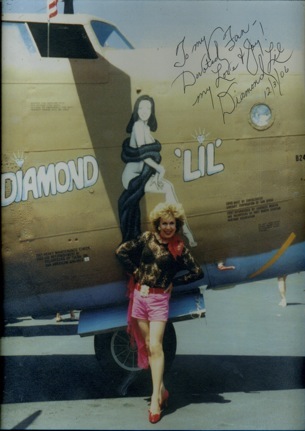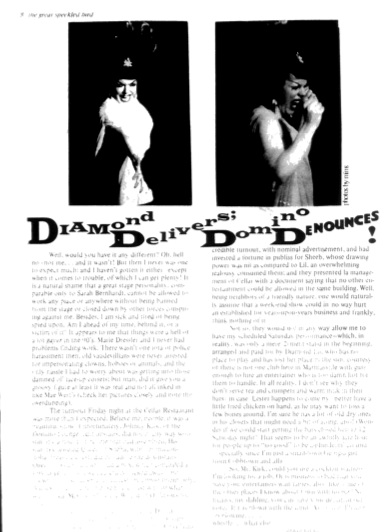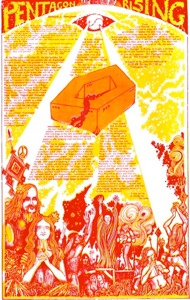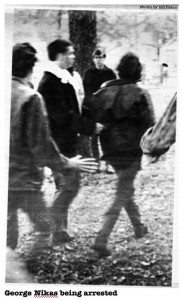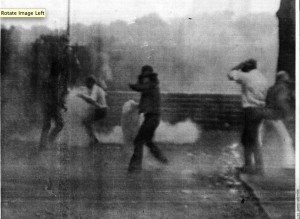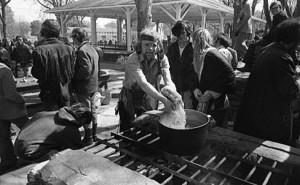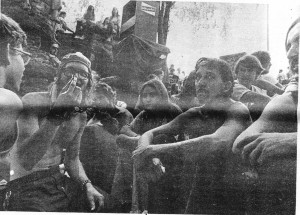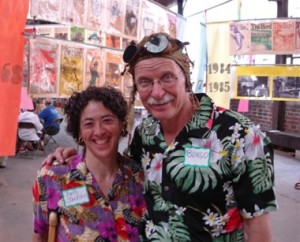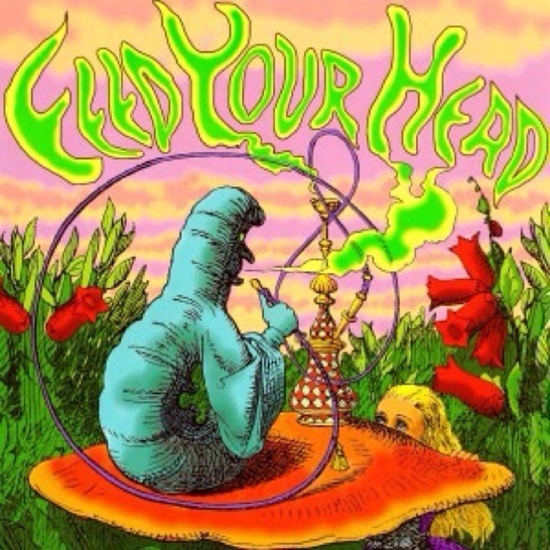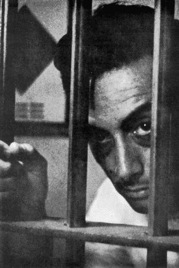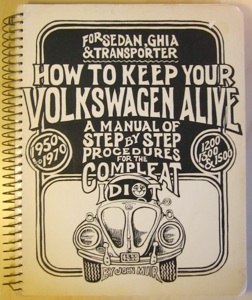The Great Speckled Bird Oct 31, 1974
Vol. 7 #44 pg. 8
Terminus
directed by Kelly Morris at the Seed & Feed Theater
To be truly great, a theater must bring forth great original works of art, goes the thinking of local director Kelly Morris. By thus promoting his Seed & Feed Theater’s first production of a new work specifically written for the company—Tom Cullen’s Terminus-Kelly, you might say, is asking to be shot down. Yet, miraculously, he has covered his bets. Terminus is not only a formidable dramatic achievement, it gives renewed vigor to the company from which it sprang. Terminus, in fact, is the first work to challenge the full capacities of the Seed & Feed players since the theater’s opening production of Tom Paine.
Like Paine, Terminus is American history reconstituted. For Tom Cullen, as for Joyce’s Stephen Dedalus, history is a nightmare from which he is trying to awake. So, to keep the visions of human “progress” from haunting and bedevilling his consciousness, he diverts himself by conjuring up a riotous assemblage of characters past, present, future and never-never (well, almost never). The scrambled sequences and dislocations that result make for an evening of theater that is joyous almost to delirium. Bring your cough drops; the throat gets mighty scratchy from uninterrupted laughing.
Cullen’s perspective—which he shares with a host of American writers is that every historical moment contains every historical possibility, that we in habit an eternal present instant whose boundaries are infinite. “God” is just convenient shorthand for the writer’s imagination, and “God” makes the universe over from scratch every time he or she draws a breath.
Looking at the world from an angle like that, Cullen thus finds it natural to turn figures from the Battle of Terminus (the original name of Atlanta) in to mythic, modern, primitive, yet-un born creatures all at once. The Rebel General Hood becomes Wagner’s Tristan, lusting for his own death; becomes Curtis LeMay, lusting to bomb the enemy back to the Stone Age; becomes Bear Bryant rebel-yelling for Auburn’s scalp. His counterpart and opposite number, William Tecumseh Sherman, is a business tycoon, a roaring capitalist, who equates demolition with progress Henry Ford, Attila, Adolf Hitler, Tamburlaine, Nero, Nelson Rockefeller, Don Shula, Faust.
In a brilliant stroke, Cullen pits these two Neanderthal types against one another in a contemporary wrestling ring. As a parody Cyclorama guide runs breathlessly through an incomprehensible narrative of the great battle, Sherman and Hood imitate the antics of contestants in the Municipal Auditorium, wrenching limbs and tearing out facial features with gleeful abandon. The great climactic Moment that shattered Scarlett’s dreams, reduced to play-acting, farce, burlesque.
Presiding over this shadow-boxing we solemnly call human history are three know-it-alls with delusions of divinity. First, there’s Dr. Croker, your Clockwork Orange mechanist with a rapier wit and bottomless contempt for the human race. Above him on the anti social ladder is Lorena, your seer, sibyl, oracle, earth mother, nature goddess, Norn, Fury, Fate—beautiful, passionless, indifferent. And finally, last and least, from whom Lorena draws what she passes off as wisdom, is Aborigine, the father, son and holy ghost of us all simian, impish, inquisitive, smartly dumb, his lips sealed by a Lucky Strike.
So much for the peripheral figures. Towering above and encompassing all of them is Ants Lumpkin the bump kin, Mr. Nobody, clown, redneck, rebel, fool. He surfaces first in hilarious Grease Sisters drag among a bevy of Southern Belles, an anti-Lorena if there ever was one. He outwits Dr. Croker’s assistants, who dress him up as an anti aborigine, his coveralls down around his ankles, a loincloth strapped over his union (!) suit, his consciousness flicking impatiently in and out of play-acting. He ascends to anti-godhood to challenge Croker on the wings of a glorious speech embracing lost causes and sits on the right hand of nobody to judge the quick and the slow in the wrestling ring.
Ants Lumpkin is the best Cullen has to offer us, “just a man” as he calls himself, “a moron” as his mother calls him, a born loser. In the person of Ants Lumpkin, Man (the play was written before Euripides stumbled on women’s lib) is truly the measure of all things. The rest of us stand or fall with him. Seeing ourselves in this hayseed, this racist, this dropout, this TVnik, this good old Georgia boy, is the measure of our ability to laugh at ourselves, to accept our own frailties.
The production stands or falls on the performance of Lumpkin. He is played to perfection by John Whittemore, a comic actor with the genius of Keaton and Chaplin. Kelly Greene puts on his usual brilliant virtuoso lunatic act as Sherman and Steve Johnson makes a delicious, rubicund, smirkishly prancing Hood. Cathy Simmons as Croker’s assistant Miss Comfort helps turn the anti-Aborigine scene into the most achingly uproarious stage episode since Falstaff got dumped out with the laundry.
Not that all is joy in Marthasville. Terminus loses its momentum following a ten-minute intermission and flounders around trying to regain its stride. It is not clear that Cullen had thought through what it meant to have Lumpkin take over as presiding divinity from Dr. Croker, and so he threw in a perfectly horrible scene (staged in an appropriately idiotic manner with garish spotlights , and indecipherable keening) intended to show the dire consequences of Lump kin’s control. It may have been supposed to recall Dante’s Inferno, but it packs the full wallop of Hush, Hush Sweet Charlotte.
There’s a serious flaw in the dramatic thinking here, and that’s what makes the scene such a stinker. Surely the significance and the actual concrete result of victory by whatever Historical force is antithetical to Crokerism can be shown on stage. Supposing the South had won? Then what? It’s a fun hypothesis to play with. Let’s play.
My own hunch about what went wrong is that Cullen’s timing was thrown off by what he considered the necessity of an intermission. Intermissions in the middle of an organic work are almost always calamities, requiring awkward, forced climaxes and fresh crankings up of energy after the audience is settled down. The Greeks had the good sense not to mess up their dramas with coffee-breaks, as did Shakespeare (the act-and-scene divisions we are familiar with in his plays were in vented by the late 17th century Pythagorean nut who compiled the Third Folio and who believed that God or Nature intended all drama to be divided into five parts). Their plays shook, heaved and rattled along without interruptions, rising and falling by the necessary beat of their own internal pulse, not by the exigencies of a groundling’s bladder.
Indeed, serious playwrights and directors have no business worrying about the creature comforts of spectators. Let the suburban dinner theaters cater to jaded appetites. Kelly’s Seed & Feed has already said to Atlanta, “You needn’t accept pabulum.” Now Kelly’s audiences should demand, in turn, that they be given the best he has to offer, no compromises. Terminus should be a non-stop, round-trip, excursion fare— to Bedlam and part way back. Cutting out the intermission and cauterizing the wound created by the gap would strengthen the play considerably.
Now that I’ve ridden my hobby horse, let me descend to earth with this stern injunction: If you let the next three weekends go by without seeing Terminus, you are going to deprive ^c yourself of a really unique opportunity to watch your own history, your own culture, undergo refashioning. Not to mention robbing yourself of an evening’s first-rate entertainment.
I’m not sure I understand all that Tom Cullen intended to express in his piquantly ambiguous conclusion, but when the icy Lorena forces Lumpkin to say he liked “it” (unspecified) because it was necessary to do so, I feel she is also addressing the audience and coercing their acceptance of the play they have just witnessed. After all, we are all players and participants, however unwilling, in the drama of history, and much as we may sympathize and laugh with Lumpkin, we’d better not be lured into facile, sentimental endorsement of his values. It’s a conundrum worth puzzling over.
—bill cutler
 Drag legend, 80, dies of cancer
Drag legend, 80, dies of cancer